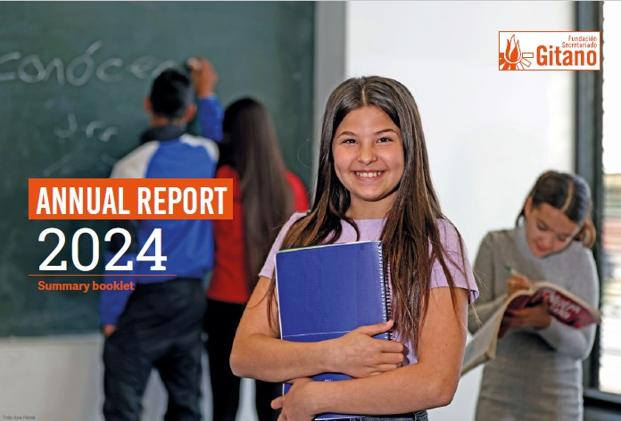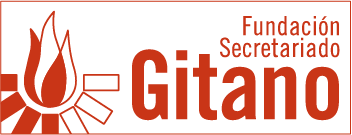Educational success, access to employment and the fight against discrimination have been the priorities for Fundación Secretariado Gitano in 2024 [editar]

We present our 2024 Annual Report in online format at www.gitanos.org/informeanual/ (in Spanish) with a summary booklet and a video with the main results of our activity.
We are a nationwide NGO with a presence in 15 Spanish regions, with 82 offices, working in 90 locations. In 2024, we directly supported 38 533 people and had nearly 140 000 participants in more than 700 programmes in training and employment, education, housing, equality and the fight against discrimination, among others.
With Sara Giménez as Director General and Jesús Loza as President, FSG has launched a new Strategic Plan 2024-2030 that sets priorities in five areas of intervention: education, employment, equal treatment, Roma women and housing, coordinating intervention with political advocacy to achieve greater social impact.
The celebration of 20 years of the ‘Discrimination and the Roma Community’ reports, the presentation of the impact of the Calí programme for the equality of Roma women in Brussels, the assistance provided to families affected by the floods in Valencia, and the presentation of the Study on the impact of the Minimum Income on poverty among the Roma in Spain are some of the milestones included in the report in a year marked by the new general management of the FSG.
Access to employment, a priority for the inclusion of the Roma
With the Acceder vocational training and employment programme, rated as the European initiative with the greatest impact on the social and labour inclusion of the Roma, we have assisted 20 672 people in 2024, of whom more than 4 500 found a job and nearly 6 000 received training. At Acceder, we collaborate with nearly 4 000 companies and address the most specific needs of young people with dual training programmes in work environments such as Learning by doing, Training with a Guarantee and TándEM, the latter in collaboration with the Spanish State Public Employment Service. With a job placement rate of around 42%, more than 600 young people have passed through these programmes this year.
For the educational success of Roma students
During the 2022/2023 school year, we have worked on our Promociona education programmes with more than 5 000 students, more than 3 800 families and nearly 1 200 educational centres.
Faced with the dramatic school failure rates among Roma students according to our latest study, Promociona's intervention ensured that of the students in the 4th year of Compulsory Secondary Education, nearly 200 graduated and of these, 90% went on to post-compulsory education. Of the students who were already in the final years of post-compulsory education, 186 graduated.
Fight against discrimination, defence of victims and strategic litigation
In the fight against discrimination, we assisted more than 1 000 victims of discrimination. We brought 23 strategic lawsuits in cases of antigypsyism before the courts and presented the 20th Annual Report on Discrimination and the Roma Community, in which we compiled 384 cases of discrimination. We continued to coordinate the Victims of Racial or Ethnic Discrimination Support Service of the Council for the Elimination of Racial or Ethnic Discrimination of the Ministry of Equality.
For the equality of Roma women
We support the personal and social advancement and employability of Roma women. We do this through our Calí programme, which offers personalised pathways. In 2024, we have assisted more than 1 000 women and carried out 450 training activities to raise awareness of gender equality, in which nearly 2 500 women and more than 1 500 men have participated. Last year, we supported more than 100 women in situations of gender-based violence.
Initiatives to break the generational cycle of poverty
We assisted nearly 17 000 people in inclusion programmes. We worked with 3 856 families with Comprehensive Intervention Plans and offered support to more than 1 800 Roma families in situations of greater exclusion to access decent housing. Through programmes funded by entities such as the ‘la Caixa’ Foundation, we assisted nearly 3 000 minors and their families with basic needs related to food, health and hygiene, and offered educational support.
Social and political advocacy to defend rights
In 2024, we participated in European Commission advisory groups and continued to coordinate the EURoma European Network, in which 15 Member States and the European Commission participate.
The publication and dissemination of the study on The educational situation of Roma students in Spain highlighted the serious situation of Roma students and the need for effective policies. With the awareness campaign NOT Back to School, we called on the public authorities to provide solutions to guarantee the right to equal education for Roma children and young people.
Once again, all our activities have been supported by the European Social Fund Plus; state and regional income tax allocations/0.7% subsidies for activities of general interest considered to be of social interest; support from regional and local administrations; entities such as the ‘la Caixa’ Foundation and companies such as Accenture, the Orange Foundation and Deloitte, among many others, as well as partners and donors.

